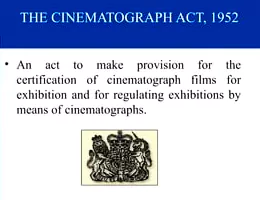Context
The Cinematograph Certification Rules 2024 have been notified by the Ministry of Information and Broadcasting, Government of India to improve the film certification process.

- Last year, the government amended the outdated Cinematograph Act of 1952 after almost 40 years.
- This amendment aimed to address various issues concerning film certification.
What are Cinematograph Certification Rules 2024?
- The Cinematograph (Amendment) Act 2023 is an Act to make provision for the certification of cinematograph films for exhibition and for regulating exhibitions by means of cinemagraphs.
- The introduction of the new Cinematograph Certification Rules 2024 is a part of last year’s government ongoing efforts.
- Significance:
- Simplify and modernize the certification process: These rules are designed to simplify and modernize the film certification process.
- Vision: The goal is to make the process more efficient, transparent, and inclusive.
- Promotes growth and success of Cinema: By aligning with global standards, these rules support the growth and success of Indian cinema.
Key Improvements Associated with the Cinematograph Certification Rules 2024
-
Streamlining Online Certification:
- Transition towards online certification: The rules have been completely revised to match the shift towards online certification processes.
-
Certification Time:
- Elimination of delays: Time taken for certifying films has been shortened by adopting fully digital processes.
- This eliminates unnecessary delays in certification procedures.
-
Accessibility for All:
- Movie accessibility to disabilities: Movies must include features that make them accessible to people with disabilities.
- Guidelines ensure inclusivity for disabled individuals in the certification process.
-
Age-Based Certification:
- Film classification: Films will now be classified into age-based categories: UA 7+, UA 13+, and UA 16+, instead of twelve years.
- These categories help parents decide if the content is suitable for their children.
- It ensures young viewers see content appropriate for their age while respecting freedom of expression and consumer choice.
-
Promoting Gender Representation:
- Rise in women’s representation: Women’s representation in the CBFC Board and Advisory Panels is increased.
- One-third of Board members, preferably half, should be women, promoting gender diversity.
-
Priority Screening System:
- Introduction of Film screening system: A system for prioritizing film screenings has been introduced.
- Filmmakers can request expedited screenings if they have urgent release commitments, enhancing transparency and efficiency.
-
Perpetual Validity of Certificates:
- Validity of certification: Certificates issued by the CBFC no longer have a validity period of only ten years.
- They are now valid indefinitely, providing long-term assurance to filmmakers.
-
Television Broadcast Standards:
-
- Recertification of edited films: Edited films must be recertified before broadcast on television.
- Only films classified as “Unrestricted Public Exhibition” can be shown on TV, ensuring content suitability.
What Are legal Guidelines for Film Certification in India?
Film certification in India is governed by legal guidelines set forth by the Central Board of Film Certification (CBFC) under the provisions of the Cinematograph Act, of 1952.
The Central Board of Film Certification (CBFC)
- This body operates as a statutory entity under the Ministry of Information and Broadcasting.
- It is known as the Censor Board.
- Key Role: To oversee the public screening of films by the guidelines outlined in the Cinematograph Act of 1952.
- Films are permitted for public viewing only after obtaining certification from the CBFC.
|
Five Objectives for Film Certification
These guidelines provide five objectives for film certification under the Act:
(a) The medium of film remains responsible and sensitive to the values and standards of society.
(b) Artistic expression and creative freedom are not unduly curbed.
(c) Certification is responsive to social changes.
(d) The medium of film provides clean and healthy entertainment.
(e) The film is of aesthetic value and cinematically of a good standard
Legal Framework
- Earlier, The filmmaking industry in India was governed by the Cinematograph Act of 1952 and the Cinematograph Rules of 1983.
- At present, Cinematograph (amendment) act 2023 and Cinematograph certification rules 2024 govern the filmmaking industry.
Also Read: 69th National Film Awards 2023
News Source: PIB
![]() 16 Mar 2024
16 Mar 2024
